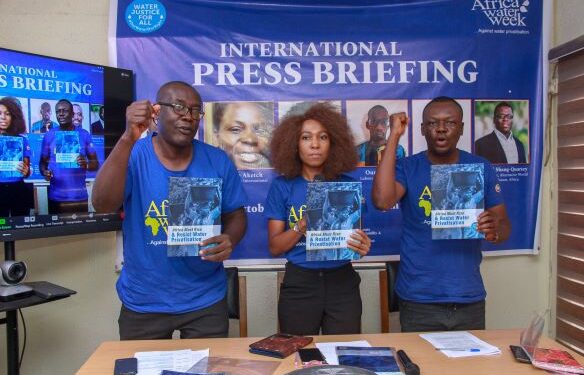Corporate Accountability and Public Participation Africa (CAPPA) has identified international corporations driving water privatization in Africa just as it trained African journalists on critical issues of human rights to water and the emerging dangers of water privatization.
While speaking on ‘Water Privatization: Dangers and Drivers’ at the two-day training, Neil Gupta, Water Campaign Director at Corporate Accountability, disclosed that corporations like Veolia AMI are behind water privatization in Africa, which has made it difficult for people to have access to safe water for their daily needs.
He revealed that despite the failed water privatization in Gabon, the World Bank promoted it as a success to other African states, stressing that water privatization poses a huge danger to human rights.
Corroborating him, Akinbode Oluwafemi, Executive Director of CAPPA, while giving his welcome remarks at the training shared that privatization is the biggest threat to human rights as it has failed over the years. Still, corporations are bent on it because they have seen it as an opportunity to make a profit.
Oluwafemi said, “one in every three Africans do not have access to portable drinking water, unfortunately, privatization has failed, they cause hikes, and job losses and there are situations where these have led to public health issues,” Oluwafemi added.
Oluwafemi mentioned that CAPPA would continue to build a very formidable resistance to water privatization and requested that Governments across Africa should make budgetary provisions to make public water available to all.
He noted that the training was necessitated as part of efforts to make the media an ally to put pressure on the government to do the needful and ensure there is a strong push back to water privatization in Africa.
Philip Jakpor, Director of Programmes at CAPPA mentioned that it is important that the media understands the role of water privatizers, stressing that, “water shortage does not happen in isolation, the private water companies invest a lot to take over our water.”
He noted that to report the water sector effectively, journalists need to put human faces to stories, speak with experts, and emphasize the interconnectedness of man and the environment.
Speaking on the impact of privatization on workers, Fatou Diouf from the Public Service Union in Senegal noted that Unions must play a crucial role in the fight against water privatization.
Journalists who have conducted investigations on water privatization also shared their experiences at the training.
Participants at the two-day training, which was moderated by Aderonke Ige, CAPPA’s Associate Director, include media professionals and civil society actors from Cameroun, Gabon, Ghana, Kenya, Mozambique, Nigeria, Senegal, United States of America and Uganda.

